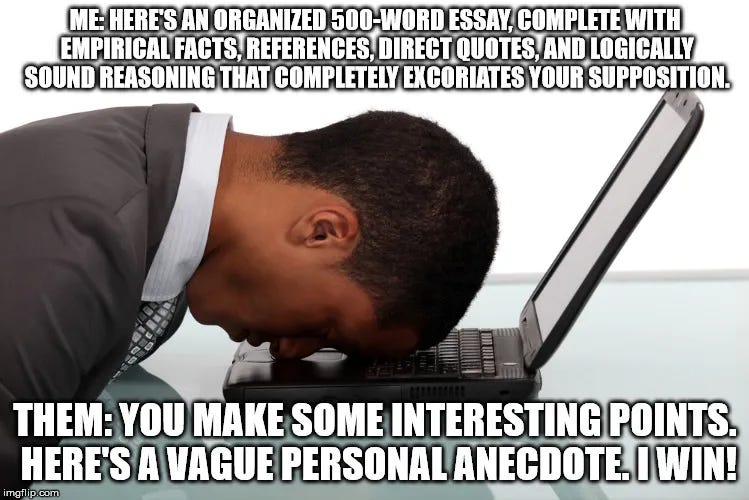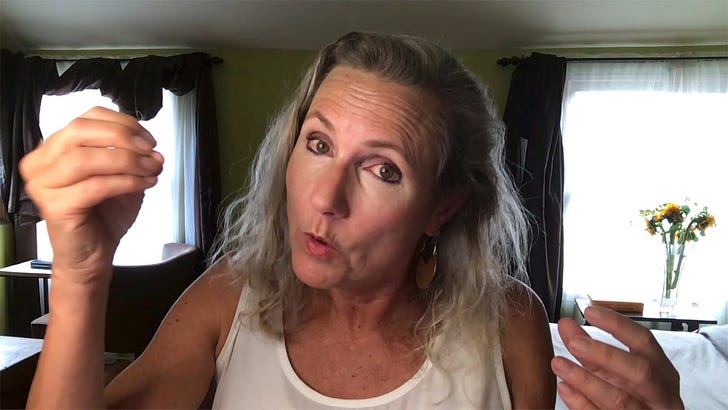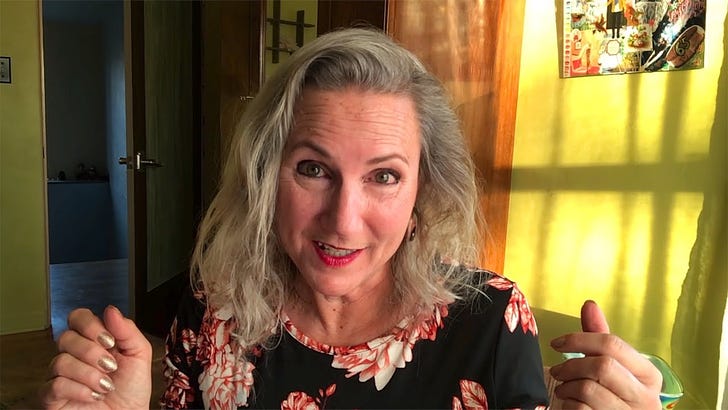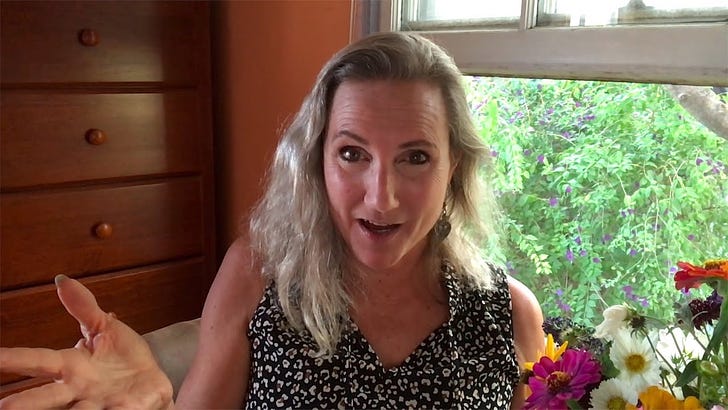How to Have a Better Argument
the third paradigm of conflict
If you interpret this title as ‘How to have a better argument against your opponent,’ you’ve already lost. Not the debate, silly, the game of life. What other purpose do we have other than to learn? Once you’ve decided that you won’t change your mind, you’ve stopped learning, as I say in When Did You Stop Being Wrong?
Conflict has a bad rap because of the false dichotomy from the conflict-adverse, who don’t want to upset people, to the conflict-attractive, who want to put other people down and show off how smart they are. The third paradigm is those who want to figure out what’s true and see the question as a quest, hopefully with other mouseketeers (keep Musk out of it!)
As I often told my daughters, you can’t create conflict. If someone says something you know to be false, even a personal attack, it doesn’t land. You can flick it off your back like a duck does water. It says something about them but not about you. Particularly if they hold no power over you, there’s no reason to be upset by someone else’s false facts, faulty logic and fallacious rhetoric.
When emotions are evoked, it’s because an inner conflict has been brought to the surface. There’s a contradiction within the person they don’t want to see. Since it can’t be pushed against with reason, it has to be pushed down with anger. No one can make you angry. Only YOU can prevent emotional dumpster fires, as Smokey the Propaganda Bear used to say.
I think we should change the rules. If you change your mind, you win the debate because you’ve gotten something out of it. But I’ve realized that the only people I can learn from are those who think they have something to learn from me. So when minds change, they change together. You both win.
Ten Steps to a Better Argument
Frame an open-ended question with more than two answers, especially yes or no. Remember that an ethical statement can have no proper nouns.
Don’t just respect or love the person you’re arguing with, actually like them. Make cocktails, give foot massages. Arguing should be fun! If you don’t like someone, don’t argue with them, unless they’re full of themselves and it gives you a foil to make your arguments to a wider audience ;-)
What does it matter? Especially why does it matter for you? What would it change? If it doesn’t matter other than showing off how smart you are, don’t bother with it.
Define what all of the terms in the question mean to you. This doesn’t have to be an agreed definition, just so you understand what the word means to the other. What is it opposed to?
Expand the realm of possible answers. Treat each one as a hypothesis. Argue for yours but don’t exclude any that are logically possible.
What would change your mind? What kind of evidence counts as admissible?
Who do you accept as authorities and on what basis? You are the only authority on your thoughts, feelings and experience—you are your own author. If people are equal, does the time spent researching a topic create credentials? Does my 200+ hrs listening to Russell Brand or my 3000+ hrs studying A Course in Miracles give me more authority than someone else? Can journalists be rated on a credibility scale based on what they stand to lose vs. what they stand to gain? Does a known and deliberate falsehood eliminate someone as an authority?
Own your dogma. Dogma is only dangerous when unexamined. Nefahotep posted Individualized Sovereignty and Political Power Structures: how can these coexist? I highly recommend reading his whole post but, to my point, he says we should never use ‘I am’ statements that end with a noun. To do this is to make ourselves small, less than everything. It’s also a tell for a dogma, that someone’s identity is tied up with an idea so any challenge is perceived as a personal attack.
Agree on the rules of engagement and that either can point out a false argument without offense. These include what the Greeks called ad hominem attacks or appeals to authority, and what I call rhetorical devisives.
Agree to keep arguing until you agree. Take bathroom breaks and order pizza. We’re retraining our habits of debate as a competitive sport, which is hard. But we need to learn how to think out loud, in tandem with others, and not invite the ego to the party.
After watching my video, YT flipped me to the BBC of UK politician Rory Stewart on arguing effectively. Although he focuses on winning, he ends by saying:
One of the things that's very difficult about argument is that in the modern world, we often see it as a very, very bad thing, arguing. Sometimes it's seen as a very male thing, a very aggressive thing, something that makes people unhappy. It's almost a form of bullying.
But if you don't argue, it is very, very difficult to get to the truth. If you just let everything slide, if nothing gets challenged, if you don't try to really pin down what somebody's saying, you get a very lazy form of thought.
And a lazy form of thought, in the end, is a version of lying.
Jason Powers of DCFPress shows how to frame the question with a new concept, developed by Kit Knightly. It shows that the NWO is especially devious because it seemingly inverts the pyramid, putting centralized global agencies in service of local economies. But as Kit and Jason aptly point out, it's "A thin polysystemic skin stretched tight over a monosystemic skeleton." Important visualization.
And the Diva Drops it again with a post chock full of argument memes:
For more, this is We Need to Agree to Agree, Polarization on Esther Perel, Winning Hearts, Changing Minds, and Domestic Truth Agents, Unite!:
As Ukraine and the Great Reset wreak havoc, we need to share a purpose, a process to separate truth from lies, and a plan. And perhaps, like the Queen in Alice in Wonderland, we need to consider six impossible things before breakfast. I look at things I never thought I'd question, like climate change and Elie Weisel. I debate good vs evil, big vs small, Franklin vs Hamilton, and Trump vs no one. And I wonder how to bring together the dozen journalists left who aren't deluded: Matthew Ehret, Robert Malone, Aaron Mate, Matt Taibbi, Glenn Greenwald and Russell Brand.
How is conflict between couples and war between nations the same and different? In a talk on polarization, Esther and Yuval discuss fighting and make up sex, Israel and Palestine, Russia and Ukraine, and small democracies. I find agreement with both in surprising areas while pointing out the logical fallacy that there is no right or wrong.
The inspiration for this episode is the book Switch: How to Change Things When Change is Hard by Chip Heath and Dan Heath. They cite The Bad Popcorn Study and why you don't have a people problem, Chocolate Chip Cookies vs Radishes and willpower exhaustion, and how to direct the Rider and motivate the Elephant. I apply these to our mission to change the global economy to enable communities to be self-reliant. In the process, I bring in the world's best flourless chocolate cake, my daughter's wedding, my leaky refrigerator, and aerial ballet Buddhas.
As Homeland Security targets Domestic Threat Agents undermining trust in US institutions, I suggest we become Domestic Truth Agents. The emerging issue of masking vs. vaccines for students is looked at as a false dichotomy intended to intensify peer pressure. Before we extend the experiment to the next generation, I suggest we analyze the data on adults from 2021. This video includes the one removed from YT, How to Lie with Statistics, that I snuck back in with new intro.










I don't bother debating. Debate is not about finding the truth, it's about having the correct techniques of logic/illogic in order to "win".
If someone believes in something that I know is total bullshit and they're not interested in contrary information, there's no need to argue.
2 relevant quotes which give a view of why some people won't change their minds until they viscerally feel the need to change...
"And then there is the psychological effect of the Big Lie which is axiomatic in gaslighting. The paradox here is that the bigger the lie, the harder it is for the mind to bridge the gulf between perceived reality and the lie that authority figures are painting as truth. I believe that the prospect of being deceived evinces a primitive emotional response on a par with staring death in the face. We are hard-wired to fear deception because we have evolved to interpret it as an existential threat. That’s why deception can elicit the same emotional response as the miscalculation of a serious physical threat. Lies told to us don’t always bear the same cost as a misjudged red light, but the primitive part of the brain can’t make this distinction and we rely on cerebral mediation for a more appropriate but delayed response. And in the long run, the lie is often just as dangerous as the physical threat. Many government whoppers – ‘safe and effective’ – do cost lives.
To avoid the death-like experience of being deceived, a mental defence is erected to deny that the lie is happening."
(From https://leftlockdownsceptics.com/alleged-cia-involvement-in-jfk-assassination-goes-mainstream-so-now-what/ )
------
"The evolutionary psychologist William von Hippel found that humans use large parts of thinking power to navigate social world rather than perform independent analysis and decision making. For most people it is the mechanism that, in case of doubt, will prevent one from thinking what is right if, in return, it endangers one’s social status. This phenomenon occurs more strongly the higher a person’s social status. Another factor is that the more educated and more theoretically intelligent a person is, the more their brain is adept at selling them the biggest nonsense as a reasonable idea, as long as it elevates their social status. The upper educated class tends to be more inclined than ordinary people to chase some intellectual boondoggle. "
-Sasha Latypova
"... and what I call rhetorical devisives."
There's so much good stuff here that I'm trying hard not to hijack the thread, but I simply cannot resist complimenting you on that. Your plays on words are always delightful, but that one is in a class of its own!
PS My own dear mother used to tell ol pops that he should never argue with his wife, he should just dicker. Then they'd both roar, like I'm doing now. I plead innocence of the outcome!